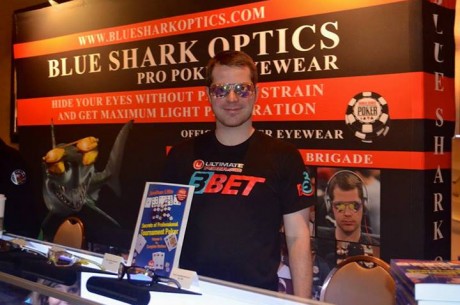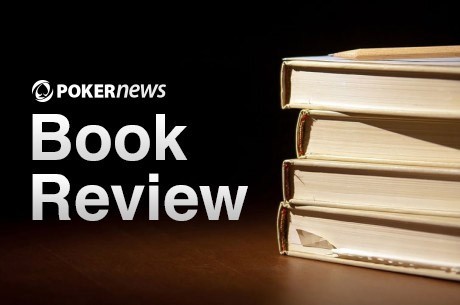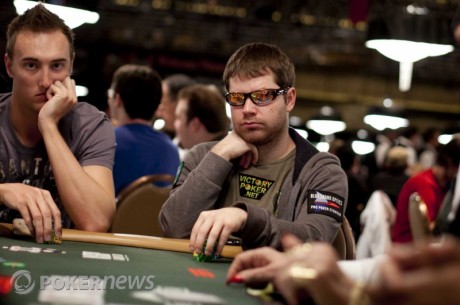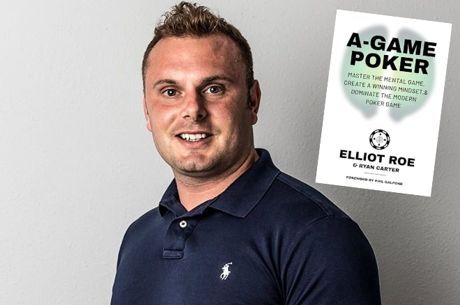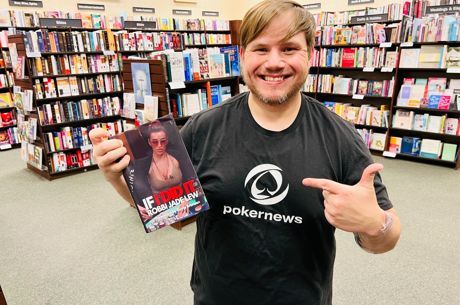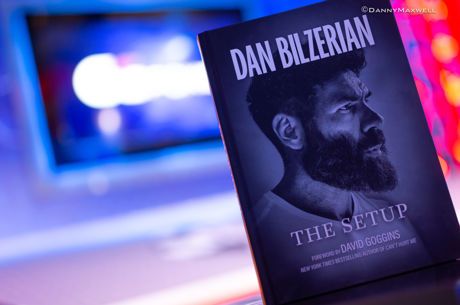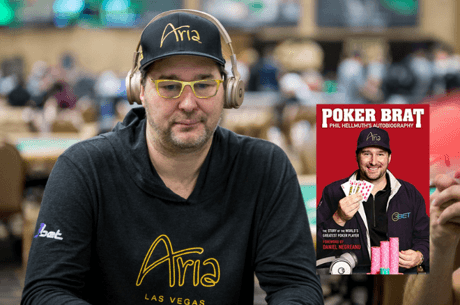Authors Discuss the Education of a Modern Poker Player in New Book

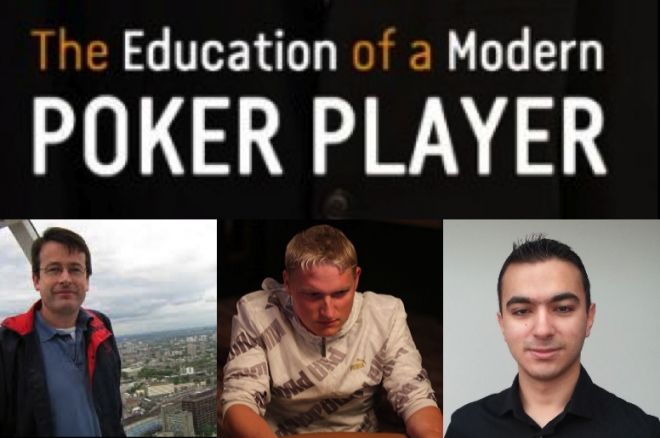
In 1957, Herbert O. Yardley wrote the now classic poker text The Education of a Poker Player. In it, Yardley blended stories from his life with revealing poker strategies. Now, two players – Thomas “TwiceT” Tiroch and Emanuel “Manu” Cinca – and their student – math professor John Billingham – have paid homage in their new book, The Education of a Modern Poker Player.
The new text seeks to describe the skills that a player needs to succeed in today’s online poker world while also documenting Billingham’s journey from mathematician fish to an experienced player. Along the way they utilize a conversational style to touch upon the psychology of poker; offer strategy of Yardley’s favorite game, five-card draw; and talk about the difficulties they faced as a result of Black Friday.
Check out The Education of a Modern Poker Player in the PokerNews Book Section.
PokerNews recently had the opportunity to speak with all three authors about the book.
PokerNews: Can you introduce yourselves to our readers and give us a brief glimpse into your backgrounds?
John Billingham (JB): I'm a professor at the University of Nottingham, and before the summer of 2009 I'd never played any poker, but then my brother-in-law showed me Zynga poker on Facebook and I was hooked. I gradually got sucked into the poker world and started blogging on pokerstrategy.com, made lots of new friends and got interested in the mathematics of poker.
Emanuel “Manu” Cinca (EC): I’m a former (starting January 2014) professional poker player, now focusing 100% on my business in Vienna. I was born and raised in Romania and got into poker in my last year of high school, four years ago. After high school I had two attempts at university, one technical and one business oriented, but neither seemed optimal for my plans. Poker is the ultimate teacher; you have to learn how to learn, at which point attending university is not a requirement. There’s more useful information online than in old school universities.
Thomas “TwiceT” Tiroch (TT): Read the book, it's all in there. I don't want to spoil our epic backgrounds. Other than that I fully focus on various business ventures I am involved in now and don't play poker professionally any more. Finishing the book also marks the end of my poker career. I will always be in love with the game and I would consider my mindset to be one of a poker pro much more than an academic or a business guy. The game taught me a lot and I cannot see any better teacher for professional life. Poker was great for a university and travelling lifestyle, but I never planned on playing forever.
What inspired you to write The Education of a Modern Poker Player?
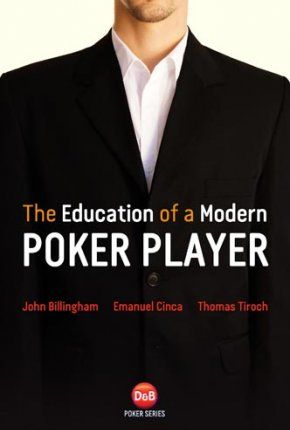
JB: I wanted to improve my game, I like to write, and I thought I saw a gap in the market for a different kind of poker book.
TT: JB tricked me into it. I tricked Manu into it.
EC: JB was the one inspired to write this book, but I can say I was convinced when I was given the power to flame a math prof like JB in public.
The poker world is saturated with strategy books. What sets yours apart?
JB: I think two main things. Firstly, the format of the book is unusual, because it's nominally about me and my progress as a player, and uses a very conversational style, often literally conversations between the three of us, to get its points across. Secondly, the book is very eclectic, with theory and lots of examples of real hands, including plenty of instances of me completely butchering a hand in an instructive way and getting my arse handed to me on a plate, both by my opponents and, more often, my coauthors.
TT: It's the story of an old chap who happens to be a math prof as he moves from beginner to intermediate and a very smart poker player. Readers should be able to identify with JB as he tries to move up the limits from NL10 to NL200. Like JB, most players are not full time pros but have a family and a job to deal with too.
EC: It’s one person’s journey to learning solid poker. This means the advice is tailored for someone that already knows bits and pieces of the game, some incorrect, some incomplete. It shows that poker can be a game for everyone, not just 20 year old dropouts.
When writing the book, did you decide to include certain things (i.e. Five Card Draw strategy, advice on Fast Fold Games, etc.) to help differentiate yourselves?
JB: We didn't set out to do that before we started. The idea was always that I would play and be coached, and that we would document how I progressed. I started playing Fast Fold Games because my work and family commitments made it so hard for me to fit in the volume of hands that my coaches demanded from me. Both TT and I had some real life difficulties in the summer of 2011, and Full Tilt borrowed my entire bankroll, so we almost abandoned the book. I started playing Five Card Draw pretty much on a whim, but I ended up being very successful at it and getting drawn into learning all the other poker variants. As that's what happened, that's what ended up in the book.
The book is written by the three of you, thus it has three distinct voices. Was this hard to reconcile when constructing your narrative?
JB: Since my coauthors are semi-literate foreigners, we decided that I'd structure and edit the book, so all I had to do was correct their grammar whilst trying to avoid losing their distinctive styles. I think it actually made the book easier to construct simply because there was a natural, pre-existing narrative. Had there been only one author, it would probably have been harder. I've read plenty of poker books that don't seem to have any narrative line at all.
TT: No, we are pros. Also, JB has multiple voices in his head anyway, so it was easy to adapt.
Would you say this book is geared more toward online players than live?
TT: Yes, because we only have one chapter on live play specifically in the book, but still, it's the same game, so I wouldn't over-emphasize the difference between 6-max online and full ring live. Of course you need to adapt completely differently, but the underlying strategies that you base your decisions on are very similar.
JB: Poker is poker, wherever it's played, and whatever variant you're playing. There are basic underlying principles that don't change from game to game. The hand examples in the book are all from online play, but I don't think that means the book is only for online players.
EC: Most of the concepts apply for poker in general but since it doesn’t touch in depth on live poker specifics but more on online 6-max games, I think yes, it’s geared more toward online players.
The book was being written when Black Friday struck. How did Black Friday impact the book (did it threaten its completion)? Likewise, how did it impact you each individually?
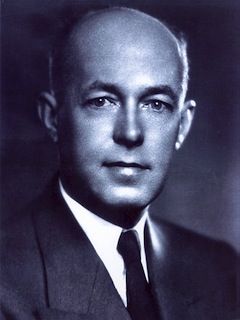
JB: As I said above, Black Friday almost killed the book, but I think it ended up making it better because it gave us a natural way to break up the narrative and keep it varied and interesting.
TT: JB lost his four-digit bankroll and was busto which slowed us down quite a bit. I lost five digits but - as a man of diversification - had bankrolls on multiple platforms and was not affected that much by it.
EC: Personally, I had most of my money stuck on FTP. It delayed my progress in poker but aside from that I had low enough expenses and money set aside that it didn’t impact other parts of my life.
Did you have any conflict with your title given it’s so close to Yardley’s “The Education of a Poker Player”?
TT: No, Yardley should be thankful as he gets free marketing now.
JB: The title is a homage to Yardley's classic. That book tells his life story with some poker strategy thrown in. Our book, although it nominally tells my story, really only uses it as a structure that allows my expert coauthors to teach the reader.
EC: No, it’s meant as praise for his format and it was never hidden that JB was inspired by that book.
What’s the reception from the poker community been like?
TT: They loved us before. Many love us still. Some even paid for the book. All good.
JB: I've not heard anybody say anything bad about it, and there have been some nice reviews online. We wrote the book for our own reasons, and we're very happy with it.
EC: It’s been positive so far. Everyone likes the format and it makes it easier to learn from it.
Do any of you have plans for more books in the future?
JB: TT and Manu did threaten to teach me PLO one day, but I have a good understanding of the variance involved, so I said I'd probably need a stake. I don't think they can afford it to be honest. I'm toying with the idea of writing a textbook on Fluid Mechanics. Would you like to review that too?
TT: Business and/or mindset books for me, if any. No more poker most likely. You never know though.
EC: No immediate plans but long term, yes. I can’t guarantee it will be a poker book; maybe a book about an epic Heads Up battle against Captain Tony G himself?
Buy your copy of The Education of a Modern Poker Player in the PokerNews Book Section.
For more on the book, check out this introductory video:
Get all the latest PokerNews updates on your social media outlets. Follow us on Twitter and find us on both Facebook and Google+!

PR & Media Manager for PokerNews, Podcast host & 2013 WSOP Bracelet Winner.
